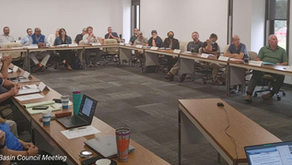Moving from Good Facilitation to Great Facilitation
- JD Solomon
- Aug 11, 2020
- 2 min read
Updated: Dec 24, 2022

The good news is that the basics remain the same whether you are facilitating in person, virtually (remotely), or in a hybrid format. A person (facilitator) still leads a group of diverse people to create and agree upon a course of action.
The obvious challenge in a pandemic is that we do it virtually. Approaches, skills, and techniques must be sharper. We do not have time for facilitators to “move from good to great.” In a pandemic, facilitators must be great.
The key concepts discussed in the previous post – facilitator characteristics, facilitator roles & responsibilities, and troubleshooting – are essential for all good facilitators.
Good to Great Facilitation
Five essential topics are briefly discussed for moving from a good to a great facilitator.
Powerful Questions because active thought and dynamic debate are necessary for compelling results. Powerful Questions come in the form of introductory questions and clarifying questions. Great facilitators have different approaches and types of questions within each category.
Pre-Session Participant Exchange because great facilitation takes work to achieve meaningful outcomes. Pre-Session Participant Exchange is exponentially important in the era of pandemic-driven remote sessions. Great facilitators understand that the worst outcome is wasting everyone’s time.
Exercises that Engage because interaction produces input from all participants and generates a collaborative atmosphere. A great facilitator has many exercises in their bag. Great facilitators migrate those exercises into the virtual space for remote participants.
Anticipate Disruption because disruption is going to happen. Disruptions in live sessions usually are in the form of verbal confrontations or physical gestures. In remote sessions, disruption may come in the form of silence. Great facilitators embrace the reality of all types of disruption and are prepared to move through it.
Control the Tempo, Roll with the Ebb and Flow because getting a group of people to create and agree on solutions is not a linear process. This is especially true with remote facilitation when body language is not always discernable and there is no time to chat during breaks. Great facilitators appreciate – even thrive – on the peaks and valleys and are not frustrated by the give-and-take of the process.
Moving Forward
We would all like to meet face-to-face to create, develop, and agree upon solutions and future actions. Arguably, facilitators like it too because it is easier to get some type of results when you are in person.
As those of us know who have facilitated virtually long before the current pandemic, there is no room for being sloppy or just being average. Facilitating virtually heightens the need for everything to be sharper and proven. Virtual facilitation requires moving from good to great.
JD Solomon Inc provides facilitation, asset management, and program development solutions at the nexus of facilities, infrastructure, and the environment. Contact us for more information about providing facilitation for your organization or training your future facilitators.







Comentários